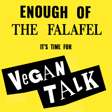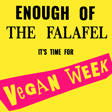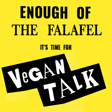
208- Using a cow to catch a leopard...yes, really
Kate, Carlos & Ant look at nine stories from around the world that relate to veganism & animal rights, including wins- such as a ban on Greyhound Racing in Wales- setbacks- such as a deeply biased 'health' story from the i paper, and campaigns- such as the one from India, where activists are trying to end the horrendous practice of using live bait to catch big cats.
****************
Enough of the Falafel is a community of people who love keeping on top of the latest news in the world of veganism & animal rights. With the Vegan Week podcast, we aim to keep listeners (& ourselves) informed & up-to-date with the latest developments that affect vegans & non-human animals; giving insight, whilst staying balanced; remaining true to our vegan ethics, whilst constantly seeking to grow & develop.
Each week we look through news stories from the past 7 days in the world of veganism & animal rights.
If you spot any news stories that might catch our fancy, or have an idea for a discussion topic, get in touch via enoughofthefalafel@gmail.com.
*******************
This week's stories:
https://www.exetertoday.co.uk/news/local-news/1900554/uk-s-largest-animal-rescue-sees-devon-s-donkey-sanctuary-play-vital-role.html
https://www.thehindu.com/news/national/karnataka/animal-rights-groups-for-ban-on-using-live-bait-to-capture-big-cats/article70070241.ece
https://seashepherd.org/2025/09/18/join-sea-shepherds-boston-waterway-cleanup-sept-28th/
https://www.league.org.uk/news-and-resources/news/ending-greyhound-racing-wales/
https://www.bbc.co.uk/news/articles/c39rr09kyxlo
https://www.worldanimalprotection.org/latest/news/wildlife-farming-in-kenya/
https://www.farminguk.com/news/dairy-sector-told-to-defend-its-reputation-amid-social-media-scrutiny_67257.html
https://plantbasednews.org/animals/brazil-partial-ban-live-animal-testing/
https://inews.co.uk/news/science/why-vegan-more-risks-women-children-3934459?srsltid=AfmBOopo4-P7iRiKTg0WTc8ym93_ub01bNeka_SA3tVF96oPxbfq7VaX
****************
Thanks everyone for listening; give us a rating and drop us a message to say "hi"; it'll make our day!
Kate, Carlos & Ant


